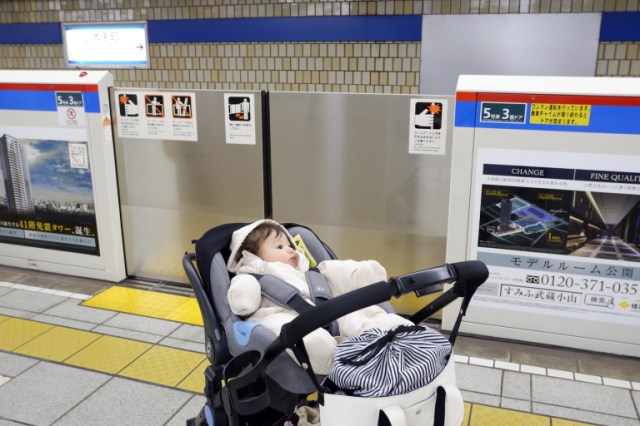
Our reporter worried she and her baby would be harassed on the trains, but what she experienced was quite unexpected.
When you live overseas for a long time and come back to your home country for a visit, the things that used to be so familiar to you now might seem strange. For example, after living in Japan for nearly six years, going back to the States and seeing the state of American convenience store food was a supreme shock. Lukewarm hot dogs and taquitos with suspicious contents? No thanks. Where are the oden and the meat beans and the juicy fried chicken??
Our Japanese-language reporter Sweetsholic expected a similar experience recently when she returned to visit Japan with her baby. She’s been living in the city of Toulouse in southern France for years with her French husband, and when she was getting ready to bring her six-month-old to Japan for a visit, she was most worried about how she was going to get around Tokyo with her baby.
In France, no matter how big strollers are, getting around on public transport is easy. Not only are there open seats for parents with strollers on the trains, but navigating the subway stations is also convenient, with elevators taking you directly from the ticket gates to the platform.
Considering that Japanese train passengers are often disdainful towards parents with strollers on trains, Sweetsholic was nervous. Were her worries unfounded? Here are four things she felt and experienced while she was travelling with her baby and stroller during her three-week trip in Japan.
1. Some Japanese trains have designated stroller areas
Luckily, on the Tokyo Metro, the subway network that Sweetsholic most used, there was a specific space on the car where she could set her stroller without folding it up. There were usually people standing there when she got on, but more often than not they would move to make room for her when she approached.
On the subway cars in Toulouse, there is no such a designated space for strollers, but there are two or three open spaces that anyone could use, so she usually puts her stroller there. People also often give up their seats for the elderly, pregnant women, and people with strollers and children, even in the areas not designated as priority seating (this may not be something that happens in all of France, admits Sweetsholic, as the south of France is a very laid-back area).
2. There are not enough elevators in Japanese stations
On the other hand, the one thing that really bothered her about riding the Japanese subway with her daughter was that there are very few elevators in the stations, especially compared to French stations. Sometimes the elevator would be on the opposite side of the platform from the ticket gates, so you have to walk all the way from one end of the platform to the other to get to the elevator, and then, once you’ve taken it up to the floor with the gates, you have to walk all the way back to exit the station. When you have to change trains, it’s a real nightmare!
It’s especially hard in stations that are really busy and really big, like Shinjuku Station. Sometimes the lines for the elevators there are really long, which makes traveling on a tight schedule very difficult. Sweetsholic mostly avoided peak hours, but even then the lines were horrendous. She couldn’t imagine what it would be like during rush hour.
▼ A passageway in Shinjuku Sanchome station. Imagine pushing a stroller all the way down there only to find there’s no elevator!
Toulouse’s trains, by the way, also get very crowded during rush hour, so she generally avoids taking her baby on the train then, too.
3. People in Japan were much more helpful than she expected
There was more than one occasion when Sweetsholic just couldn’t find the elevator, and ended up picking up her stroller, with her baby inside, and carrying it up or down the stairs. Once, just as she was thinking what a pain it was, an older man offered to carry the stroller for her. At another station, a fellow female passenger also offered to help her carry her stroller down a particularly long set of stairs. In fact, there were many women who offered to help her at stations all around the city.
She was very touched that not only station attendants but other passengers were so willing to help her, even without her asking.
4. Many people on Japanese trains helped to comfort her baby
One other thing that Sweetsholic was worried about was what would happen if her baby started to cry on the train. Sweetsholic had heard that Japanese people are often rude to parents when that happens, so she hoped beyond hope that her daughter would be well-behaved.
▼ “How dare that baby act like a baby?!”
One day Sweetsholic’s fears came true when her usually happy daughter started to get fussy on a very crowded train. She started to cry, but they were very close to the station where they were going to get off. Sweetsholic was about to panic, until an older lady standing nearby started to comfort the baby, saying, “You’re such a good little girl! You’re doing so well. You’re almost there!” After that Sweetsholic felt the atmosphere relax, so she felt so grateful for the older woman.
In the end, Sweetsholic actually felt that riding the trains in Japan with a baby was not nearly as bad as she thought. In the news and on social media you hear horror stories of passengers kicking strollers and heckling already frazzled parents, so Sweetsholic had been really worried about bringing her large western-sized stroller on Japanese public transportation.
But on the contrary, she had been touched by how helpful people had been. Perhaps she’d had good timing, but she was so thankful for all of the of people at the stations who helped her with her stroller and who had smiling interactions with her daughter, and she decided that she, too, would make an effort to help if she saw a fellow parent struggling.
Now, if only they could do something about the lack of elevators…
Top image ©SoraNews24
Insert images: Pakutaso (1, 2, 3, 4)
● Want to hear about SoraNews24’s latest articles as soon as they’re published? Follow us on Facebook and Twitter!
[ Read in Japanese ]

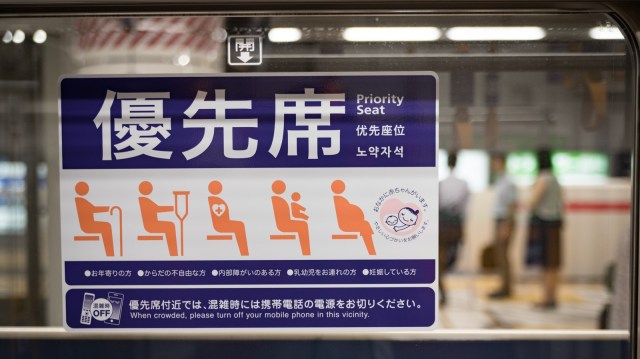
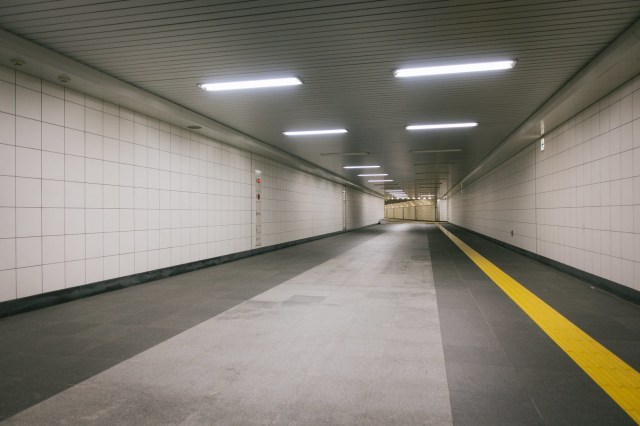
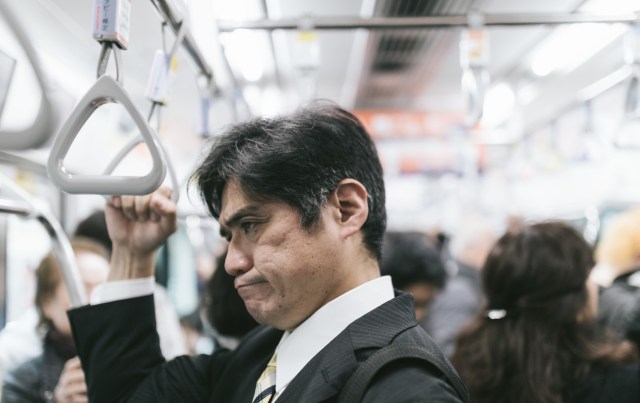
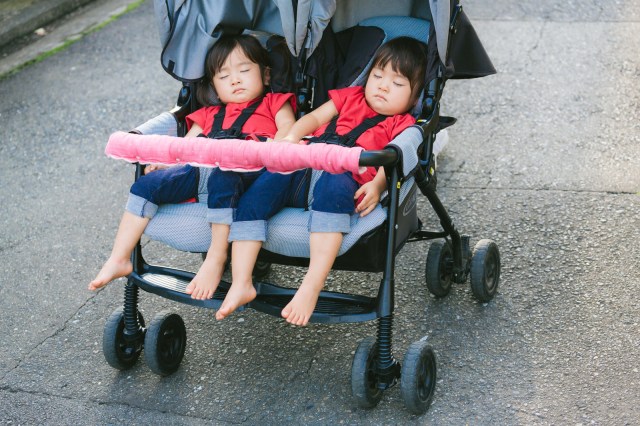
 Commuters, Mothers and Government Bump Heads Over Baby Buggy Posters
Commuters, Mothers and Government Bump Heads Over Baby Buggy Posters Train company asks parents with baby strollers to be polite to other passengers, sparks backlash
Train company asks parents with baby strollers to be polite to other passengers, sparks backlash Video of foreign diplomat riding in Tokyo subway priority seat sparks manners debate【Video】
Video of foreign diplomat riding in Tokyo subway priority seat sparks manners debate【Video】 What’s the rule for where to put strollers on Japan’s Shinkansen bullet trains?
What’s the rule for where to put strollers on Japan’s Shinkansen bullet trains? Japan bad train manners survey reminds us of three things to watch out for while riding the rails
Japan bad train manners survey reminds us of three things to watch out for while riding the rails Japanese restaurant chain serves Dragon Ball donuts and Senzu Beans this spring
Japanese restaurant chain serves Dragon Ball donuts and Senzu Beans this spring Starbucks Japan releases first-ever Hinamatsuri Girls’ Day Frappuccino
Starbucks Japan releases first-ever Hinamatsuri Girls’ Day Frappuccino Japan’s craziest burger chain takes menchi katsu to new extreme levels
Japan’s craziest burger chain takes menchi katsu to new extreme levels Drift ice in Japan is a disappearing winter miracle you need to see now
Drift ice in Japan is a disappearing winter miracle you need to see now Eevee returns to Japan’s famous Tokyo Banana, bundled with a cute tote bag
Eevee returns to Japan’s famous Tokyo Banana, bundled with a cute tote bag Take a trip to Japan’s Dododo Land, the most irritating place on Earth
Take a trip to Japan’s Dododo Land, the most irritating place on Earth Which convenience store onigiri rice balls are the most popular? Survey reveals surprising results
Which convenience store onigiri rice balls are the most popular? Survey reveals surprising results Starbucks Japan adds new sakura Frappuccino and cherry blossom drinks to the menu
Starbucks Japan adds new sakura Frappuccino and cherry blossom drinks to the menu Fives places around Japan to appreciate the plum blossoms this season
Fives places around Japan to appreciate the plum blossoms this season Kawaguchi’s mascot Cupolan doesn’t mind that you think it looks like a turd
Kawaguchi’s mascot Cupolan doesn’t mind that you think it looks like a turd Highest Starbucks in Japan set to open this spring in the Tokyo sky
Highest Starbucks in Japan set to open this spring in the Tokyo sky The 10 most annoying things foreign tourists do on Japanese trains, according to locals
The 10 most annoying things foreign tourists do on Japanese trains, according to locals Tokyo Skytree turns pink for the cherry blossom season
Tokyo Skytree turns pink for the cherry blossom season Yakuzen ramen restaurant in Tokyo is very different to a yakuza ramen restaurant
Yakuzen ramen restaurant in Tokyo is very different to a yakuza ramen restaurant Shibuya Station’s Hachiko Gate and Yamanote Line stairway locations change next month
Shibuya Station’s Hachiko Gate and Yamanote Line stairway locations change next month Starbucks Japan releases new sakura goods and drinkware for cherry blossom season 2026
Starbucks Japan releases new sakura goods and drinkware for cherry blossom season 2026 Japan Extreme Budget Travel! A trip from Tokyo to Izumo for just 30,000 yen [Part 1]
Japan Extreme Budget Travel! A trip from Tokyo to Izumo for just 30,000 yen [Part 1] Japan’s new “Cunte” contact lenses aren’t pronounced like you’re probably thinking they are
Japan’s new “Cunte” contact lenses aren’t pronounced like you’re probably thinking they are Japan’s newest Shinkansen has no seats…or passengers [Video]
Japan’s newest Shinkansen has no seats…or passengers [Video] Foreigners accounting for over 80 percent of off-course skiers needing rescue in Japan’s Hokkaido
Foreigners accounting for over 80 percent of off-course skiers needing rescue in Japan’s Hokkaido Super-salty pizza sends six kids to the hospital in Japan, linguistics blamed
Super-salty pizza sends six kids to the hospital in Japan, linguistics blamed Starbucks Japan unveils new sakura Frappuccino for cherry blossom season 2026
Starbucks Japan unveils new sakura Frappuccino for cherry blossom season 2026 Foreign tourists in Japan will get free Shinkansen tickets to promote regional tourism
Foreign tourists in Japan will get free Shinkansen tickets to promote regional tourism Naruto and Converse team up for new line of shinobi sneakers[Photos]
Naruto and Converse team up for new line of shinobi sneakers[Photos] Is China’s don’t-go-to-Japan warning affecting the lines at a popular Tokyo gyukatsu restaurant?
Is China’s don’t-go-to-Japan warning affecting the lines at a popular Tokyo gyukatsu restaurant? Survey asks foreign tourists what bothered them in Japan, more than half gave same answer
Survey asks foreign tourists what bothered them in Japan, more than half gave same answer Japan’s human washing machines will go on sale to general public, demos to be held in Tokyo
Japan’s human washing machines will go on sale to general public, demos to be held in Tokyo Starbucks Japan releases new drinkware and goods for Valentine’s Day
Starbucks Japan releases new drinkware and goods for Valentine’s Day We deeply regret going into this tunnel on our walk in the mountains of Japan
We deeply regret going into this tunnel on our walk in the mountains of Japan Studio Ghibli releases Kodama forest spirits from Princess Mononoke to light up your home
Studio Ghibli releases Kodama forest spirits from Princess Mononoke to light up your home Major Japanese hotel chain says reservations via overseas booking sites may not be valid
Major Japanese hotel chain says reservations via overseas booking sites may not be valid Put sesame oil in your coffee? Japanese maker says it’s the best way to start your day【Taste test】
Put sesame oil in your coffee? Japanese maker says it’s the best way to start your day【Taste test】 No more using real katana for tourism activities, Japan’s National Police Agency says
No more using real katana for tourism activities, Japan’s National Police Agency says Who has better manners? Blogger lists three things foreigners do that impress even the Japanese
Who has better manners? Blogger lists three things foreigners do that impress even the Japanese Distressed moms and dads on Japanese trains getting help from child assistance volunteer badges
Distressed moms and dads on Japanese trains getting help from child assistance volunteer badges Traveling to the the World Expo in Osaka with a baby? We’ve got survival tips for your family
Traveling to the the World Expo in Osaka with a baby? We’ve got survival tips for your family Japanese mom’s don’t-touch-my-baby-stroller sign stirs up debate【Video】
Japanese mom’s don’t-touch-my-baby-stroller sign stirs up debate【Video】 With Japan’s day care shortage, how hard is it to bring your baby to work with you? We experiment
With Japan’s day care shortage, how hard is it to bring your baby to work with you? We experiment Surprising amount of Japanese people find going to see their friend’s new baby annoying
Surprising amount of Japanese people find going to see their friend’s new baby annoying Tokyo train operator installs baby care rooms to make rail travel easier for parents and infants
Tokyo train operator installs baby care rooms to make rail travel easier for parents and infants What’s it like traversing Tokyo using only wheelchair accessible routes?
What’s it like traversing Tokyo using only wheelchair accessible routes? A daddy/daughter test of the free baby meals at Japan’s biggest soup restaurant chain【Taste test】
A daddy/daughter test of the free baby meals at Japan’s biggest soup restaurant chain【Taste test】 Heart-breaking plea from kids looking for their mama convinces Tokyo subway station to bend rules
Heart-breaking plea from kids looking for their mama convinces Tokyo subway station to bend rules Australian mother reflects on “lunchbox shame” she felt from her son’s Tokyo preschool teacher
Australian mother reflects on “lunchbox shame” she felt from her son’s Tokyo preschool teacher Let Uncle Tashiro show you the perfect way to enjoy Tokyo Disneyland with young kids
Let Uncle Tashiro show you the perfect way to enjoy Tokyo Disneyland with young kids